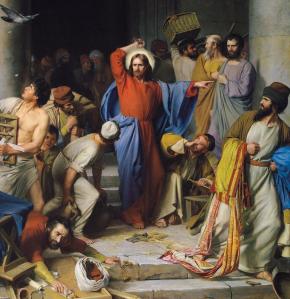 There are many who read the nineteenth chapter of the Book of Revelation and assume that Yeshua the Messiah is going to return to earth with a tattoo on his thigh. This conception is totally invalid and is caused by a complete misunderstanding of who Yeshua really is and how He lived. Unfortunately this false teaching also is fueled Antisemitic bigotry that plagues many Christian churches to this very day.
There are many who read the nineteenth chapter of the Book of Revelation and assume that Yeshua the Messiah is going to return to earth with a tattoo on his thigh. This conception is totally invalid and is caused by a complete misunderstanding of who Yeshua really is and how He lived. Unfortunately this false teaching also is fueled Antisemitic bigotry that plagues many Christian churches to this very day.
And I saw heaven opened, and behold a white horse; and he that sat upon him was called Faithful and True, and in righteousness he doth judge and make war. His eyes were as a flame of fire, and on his head were many crowns; and he had a name written, that no man knew, but he himself. And he was clothed with a vesture dipped in blood: and his name is called The Word of God. And the armies which were in heaven followed him upon white horses, clothed in fine linen, white and clean. And out of his mouth goeth a sharp sword, that with it he should smite the nations: and he shall rule them with a rod of iron: and he treadeth the winepress of the fierceness and wrath of Almighty God. And he hath on his vesture and on his thigh a name written, KING OF KINGS, AND LORD OF LORDS.
(Revelation 19:11-16 KJV)
The history of tattoos is tightly bound up with that of paganism because the first people to create and receive them were pagans or, at the very least, their ancestors whose shamanistic ways gave birth to paganism. Tattoo is one of the oldest forms of art, right after cave and rock art from prehistoric times.
Moses wrote, “Ye shall not make any cuttings in your flesh for the dead, nor print any marks upon you: I am the LORD” (Leviticus 19:28 KJV), “Ye shall not make any cuttings in your flesh for the dead, nor print any marks upon you: I am the LORD” (Leviticus 19:28 KJV) and “Ye shall not make any cuttings in your flesh for the dead, nor print any marks upon you: I am the LORD” (Leviticus 19:28 KJV).
Clearly the Torah (instruction) teaches us that tattoos are forbidden by HaShem. This prohibition is only one of the 365 negative mitzvot (commandments) contained within the Torah. In our day, the prohibition against all forms of tattooing regardless of their intent, should be maintained. Tattooing becomes even more distasteful in a contemporary secular society that is constantly challenging the concept that we are created in the image of HaShem (Genesis 1:27) and that our bodies are to be viewed as a precious gift on loan from HaShem, to be entrusted into our care and are not our personal property to do with as we choose (1 Corinthians 6:19-20). Voluntary tattooing even if not done for idolatrous purposes expresses a negation of this fundamental perspective.
Yeshua was a tzitzit wearing, Torah-Observant Jew. Obviously, it would be impossible for Yeshua to break the commandments of the Torah (1 Peter 2:22; Hebrews 4:15).
A tzitzit is the name for specially knotted ritual fringes worn by observant Jews. Tzitzit are attached to the four corners of the tallit (prayer shawl) and tallit katan (small tallit). The wearing of tzitzit by observant Jews is also mandated by the Torah. It is only one of the 248 positive mitzvot contained within the Torah. Rabbinical scholars equate the observance of the tzitzit mitzvot with that of all other mitzvot. One Rabbinical scholar, Maimonides, includes it as a major commandment along with circumcision and the Passover offering.
And YHWH spake unto Moses, saying, Speak unto the children of Israel, and bid them that they make them fringes in the borders of their garments throughout their generations, and that they put upon the fringe of the borders a ribband of blue: And it shall be unto you for a fringe, that ye may look upon it, and remember all the commandments of YHWH, and do them; and that ye seek not after your own heart and your own eyes, after which ye use to go a whoring: That ye may remember, and do all my commandments, and be holy unto your Elohim. I am YHWH your Elohim, which brought you out of the land of Egypt, to be your Elohim: I am YHWH your Elohim.
(Numbers 15:37-41 RNKJV)
The tassel (tzitzit) on each corner is made of four strands, which must be made with intent. These strands are then threaded and hang down, appearing to be eight. The four strands are passed through a hole 1-2 inches away from the corner of the cloth. There are numerous customs as to how to tie the tassels. Some Rabbinical commentaries explain that the Bible requires an upper knot (kesher elyon) and one wrapping of three winds (hulya). They instructed that between 7 to 13 hulyot be tied, and that “one must start and end with the color of the garment.” As for the making of knots in between the hulyot, the Rabbinical commentaries are inconclusive, and as such the designers of Jewish law have interpreted this requirement in various ways. The various commentaries described tying assuming the use of tekhelet dye, however, following the loss of the source of the dye, various customs of tying were introduced to compensate for the lack of this primary element.
Though many methods exist, the one that gained the widest acceptance can be described as follows:
The four strands of the tzitzit are passed through holes near the four corners of the garment that are farthest apart. Four tzitzyot are passed through each hole, and the two groups of four ends are double-knotted to each other at the edge of the garment near the hole. One of the four tzitzit is made longer than the others; the long end of that one is wound around the other seven ends and double-knotted; this is done repeatedly so as to make a total of five double knots separated by four sections of winding, with a total length of at least four inches, leaving free-hanging ends that are twice that long.
Before tying begins, declaration of intent is recited: L’Shem Mitzvat Tzitzit (“for the sake of the commandment of tzitzit”).
The two sets of stands are knotted together twice, and then the shamash (a longer strand) is wound around the remaining seven strands a number of times (see below). The two sets are then knotted again twice. This procedure is repeated three times, such that there are a total of five knots, the four intervening spaces being taken up by windings numbering 7-8-11-13, respectively. The total number of winds comes to 39, which is the same number of winds if one were to tie according to the Talmud’s instruction of 13 hulyot of 3 winds each. Furthermore, the number 39 is found to be significant in that it is the gematria (numerical equivalent) of the words: “The Lord is One” (Deuteronomy 6:4). Others, especially Sephardi Jews, use 10-5-6-5 as the number of windings, a combination that represents directly the spelling of the Tetragrammaton (YHWH).
Rashi, a prominent Jewish commentator, bases the number of knots on a gematria: the word tzitzit (in its Mishnaic spelling) has the value 600. Each tassel has eight threads (when doubled over) and five sets of knots, totalling 13. The sum of all numbers is 613, traditionally the number of mitzvot in the Torah. This reflects the concept that donning a garment with tzitzyot reminds its wearer of all Torah commandments.
Maimonides disagrees with Rashi, pointing out that the Biblical spelling of the word tzitzit has only one yod rather than two (giving it a gematria of 590 plus 13), thus adding up to the total number of 603 rather than 613. He points out that in the Biblical quote “you shall see it and remember them”, the singular form “it” can refer only to the p’til (thread) of tekhelet. The tekhelet strand serves this purpose, explains the commentaries, for the blue color of tekhelet resembles the ocean, which in turn resembles the sky, which in turn is said to resemble HaShem’s holy throne, thus reminding all of the divine mission to fulfill His commandments.
When wearing a tzitzit, the tassels hang to the thigh of the person wearing the tzitzit. Obviosly then, Yeshua will not have a tattoo on His thigh. He may very possibly be wearing a tzitzit with a combination of knots, wrappings and embroidering that will contain His title, “KING OF KINGS AND LORD OF LORDS.”
Todd Bentley, the Canadian “Evangelist” (http://www.freshfire.ca/) has claimed that he has piercings and tattoos because Yeshua also has piercings and tattoos. He is referring to this passage in the Book of Revelation (Revelation 19:11-16) and the wounds from the crucifixion. This is total blasphemy to compare his tattoos and piercings with misinterpreted Scriptures and the suffering inflicted upon Yeshua at His crucifixion as a means to justify his own tattoos (include a recent tattoo of a demon in a rose) and many body piercings.
Todd Bentley and Fresh Fire Ministries was also part of the Lakeland Revival. The Lakeland Revival was related to the Toronto Blessing in Canada and the Brownsville Revival in Pensacola, Florida. However, the Lakeland Revival had a greater focus on divine healing along with a call to evangelism, was much shorter than these two revivals, and was nearly inseparable from Todd Bentley. The revival displayed many “ecstatic manifestations” and some participants claimed “esoteric experiences”, such as divinely inspired visions and prophecies. In addition to claims of numerous miraculous healings, there were at least 30 claims to cases of resurrection of the dead (all unsubstantiated). The Toronto Blessing is the movement responsible for “Holy Laughter” which is sometimes manifested with uncontrollable laughter and even projectile vomiting.
Todd Bentley has been criticized for occasional violence against “worshipers” at his “revivals”. He has been known to forcefully kick, hit, smack or knock over participants. In one incident, a man was knocked over and lost a tooth. In another, an elderly woman was intentionally kicked in the face. Todd Bentley held claims the Holy Spirit led him to such actions, saying that those incidents were taken out of context and adding that miracles were happening simultaneously.
Every Word of Elohim is refined, He is a shield to those who seek refuge in Him. Do not add to His Words, that He not reprove you, and you be found a liar.
(Proverbs 30:5-6 HRB)




















